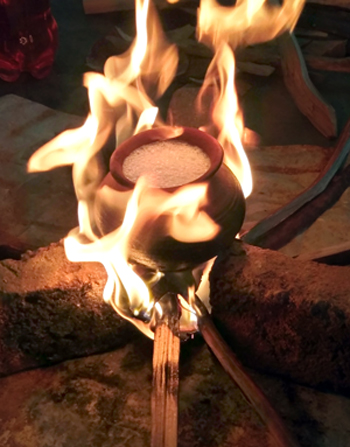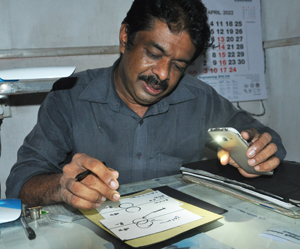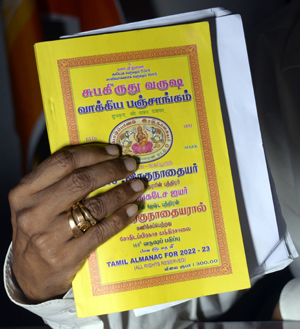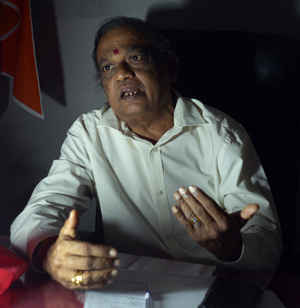Time is the essence of New Year
 Avurudu is the apotheosis of the old Sinhalese (solar) calendar when the sun embarks on a fresh journey and the people celebrate the harvest- a long year of sowing and reaping- with children playing on harvested fields with joy and freshness everywhere: new clothes, new pots, new paint, new kevilli, new hopes.
Avurudu is the apotheosis of the old Sinhalese (solar) calendar when the sun embarks on a fresh journey and the people celebrate the harvest- a long year of sowing and reaping- with children playing on harvested fields with joy and freshness everywhere: new clothes, new pots, new paint, new kevilli, new hopes.
‘Nekath’ or auspicious times are the focal points of the New Year.
The main purpose of the nekath is to bring the people of the country together “as one family” as they observe rituals at the same time: boiling milk to symbolise prosperity, partaking of food, worshiping elders and applying oil on hair amidst calls of the koha and Erabadu blossoms.
Says astrologer G. L. Prasanna Maliduwa that it was traditionally a time to go on a ‘new journey’ ourselves, to strengthen old relationships, and for families, villages (and now the country) to come together.
It all happens when the sun moves from the last astrological house, Pisces, to the first which is Aries.
Twelve hours and 48 minutes consist the nonagathaya also called punya kalaya – the main part of Avurudu where all the main nekath, apart from applying oil on hair, happen.
This period starts when the reflection of the sun first touches the margin of the house of Aries and ends once the orb has completely transcended to Aries (see diagram).

Astrologer G. L. Prasanna Maliduwa. Pix by Nilan Maligaspe
Naturally this period can be divided to two equal halves, each six hours and 24 minutes, and the first half (poorva bhaga or morning) is the period assigned to religious practices, where there are no nekath or auspicious times. All the nekath happen in the second half (apara bhaga or afternoon).
The word Nonagathaya comes from the two words ‘Agatha’ and ‘Anagatha’- describing, respectively, the moment when the orb’s reflection first touches the house of Aries, and the moment when the reflection has passed on completely to Aries (while touching the margin).
The tradition that ‘Nonagathaya’ comes from there being ‘no neketh’ he says is but folk etymology.
The Nekaths for the Sinhalese used to be augured in the precincts of the village vihara, where the main priest would consult the stars and let the villagers know through seettu (a list).
 However, as these times tended to differ, the late W. J. M. Lokubandara in his tenure as the Minister of Cultural Affairs appointed a committee for Avurudu nekath, and henceforth the country could observe rites together to the deafening cheer of firecrackers so inebriating to the Sri Lankan ear.
However, as these times tended to differ, the late W. J. M. Lokubandara in his tenure as the Minister of Cultural Affairs appointed a committee for Avurudu nekath, and henceforth the country could observe rites together to the deafening cheer of firecrackers so inebriating to the Sri Lankan ear.
The Sinhala nekath seettu has the following nekath: observing the moon, bathing, the dawn of the New Year, the nonagathaya, lighting the hearth, ganudenu, applying oil on hair and departing for work after the holiday.
 The only exception to this is that, at the Kandy Dalada Maligawa the nekath for applying oil to the hair, called Nanumura Mangalya, happens at a different time.
The only exception to this is that, at the Kandy Dalada Maligawa the nekath for applying oil to the hair, called Nanumura Mangalya, happens at a different time.
Dravidian derivations
The Tamils have two panchangams (almanacs; the Sinhala equivalent of which is litha) – Vakya Panchangam (more favoured) and Thirukanitha Panchangam.
They have no nonagathaya and their nekath starts with applying oil to the hair. Bathing is done four hours prior to and after the dawn of Avurudu.

Ramachandra Kurukkal Babu Sarma displaying the Vakya Panchangam
Ramachandra Kurukkal Babu Sarma, coordinator of the Hindu Religious and Cultural Affairs at the Ministry of Buddhasasana, Religious and Cultural Affairs, says that the nekath for boiling milk and partaking of food has no importance within the Dravidian frame.
Their second nekath is ganudenu (celebrating reciprocity), when family members exchange money.
The Tamils also have a nekath for commencing businesses which usually falls some weeks hence, when goddess Luxshmi is propitiated. This ritual is more favoured amongst Indians than Sri Lankan Tamils says Babu Sarma.
For the Tamils the day, while being not as important as it is for the Sinhalese, is still one of importance and after applying oil they cook the milk rice, conduct pooja, go to kovil, exchange gifts and play the puthandu games.
Searching for an ideal partner? Find your soul mate on Hitad.lk, Sri Lanka's favourite marriage proposals page. With Hitad.lk matrimonial advertisements you have access to thousands of ads from potential suitors who are looking for someone just like you.


